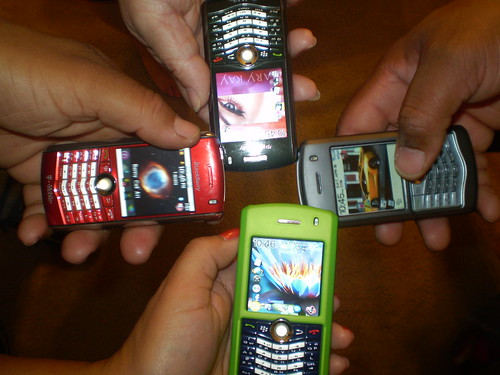This morning on The Today Show, hosts interviewed a San Diego family which was challenged to give up cell phones, computers and TV for an entire day. In addition, Tony Schwartz (author of “The Way We’re Working Isn’t Working: The Four Forgotten Needs That Energize Great Performance” addressed the need we have to take proactive control over the technology devices which seem to direct many of our lives.
Visit msnbc.com for breaking news, world news, and news about the economy
The statistic from this segment which really got my attention was the following, from Tony:
7 out of 10 families do NOT set limits for text messaging.
Wow! I suppose the temptation with an “unlimited texting plan” is to not have limits, but that course seems to be a dangerous one. I learned from Vicki Davis following her Digiteen Project that many teenagers today sleep with their cell phones under their pillows at night. This regularly causes sleep interruptions. Lack of sleep leads to all kinds of problems for teens both with health and learning at school. The absence of boundaries with cell phones and technologies more generally is a BIG problem in our society today, and this Today Show episode highlighted this trend vividly.
On page 71 of his 1993 book “Technopoly: The Surrender of Culture to Technology” Neil Postman wrote:
Technopoly is a state of culture. It is also a state of mind. It consists in the deification of technology, which means that the culture seeks its authorization in technology, finds its satisfactions in technology, and takes its orders from technology. This requires the development of a new kind of social order, and of necessity leads to the rapid dissolution of much that is associated with traditional beliefs. Those who feel most comfortable in Technopoly are those who are convinced that technical progress is humanity’s supreme achievement and the instrument by which our most profound dilemmas may be solved. They also believe that information is an unmixed blessing, which through its continued and uncontrolled production and dissemination offers increased freedom, creativity, and peace of mind. The fact that information does none of these things– but quite the opposite– seems to change few opinions, for such unwavering beliefs are an inevitable product of the structure of Technopoly. In particular, Technopoly flourishes when the defenses against information break down.
In many ways, I think we find ourselves surrounded by people who subscribe (knowingly or unknowingly) to the core tenets of Postman’s Technopoly. There is a powerful, psychological lure to social media and the digital information streams with which we can choose to bathe ourselves daily. Just coming off a week of being partially unplugged in the mountains of Colorado, perhaps I’m feeling a bit more sensitive toward these topics. While information and technology CAN serve as “bridges to creativity” as well as inspiration, I think they can also encourage us to lead distracted and interrupted lives. We all need boundaries, and this is abundantly evident when we look at the effects of unbounded digital technologies in the hands of different people – even ourselves.

![]() photo credit: evelynishere
photo credit: evelynishere
In one of his books (I don’t recall which one) Postman tells how his family would periodically “play 1870s.” The would turn off everything that used electricity in the evening, light candles, and play games together or tell stories. Last week at Camp Alexander, we had a few nights of phenomenal star gazing. It’s remarkable that we could have similar experiences at home, but we generally choose not to. Air conditioning, television, and electronic entertainment options keep most of us inside at night, and we’re frequently “plugged in.” “Digital discipline” is not one of my most frequent topics on my blog, but it’s probably one of the most important.
Are you finding ways to unplug these days? It’s an intentional act we should all choose more often.

![]() photo credit: Rennett Stowe
photo credit: Rennett Stowe
Technorati Tags:
cell, message, mobile, phone, tech, technology, text, unplug, postman, sms, messaging
If you enjoyed this post and found it useful, subscribe to Wes’ free newsletter. Check out Wes’ video tutorial library, “Playing with Media.” Information about more ways to learn with Dr. Wesley Fryer are available on wesfryer.com/after.
On this day..
- Remembering the Days of Kodachrome – 2011
- Google Documents introduces Templates – 2009
- Chaiwan, The Innovation Economy, and our need to Educationally as well as Economically Re-Imagine Ourselves – 2009
- Pocket camcorder first impressions – 2008
- Unstructured practice can be a key to excellence – 2007
- VoiceThread versus BubbleShare – 2007
- Email becoming irrelevant? Not for most teachers! – 2007
- Make eBooks, webpages, quizzes and other content iPod-mobile! – 2007

Comments
7 responses to “Digital boundaries are few and far between in Technopoly”
This was a much needed post. I had a friend who was going to unplug for a month. He only lasted a day until he had to use his cellphone to connect with friends and find something to do. Boredom set in. I love reading your blog.
[…] read the full story, CLICK HERE If you enjoyed this article, please consider sharing it! Tagged with: education […]
Thanks, Wes. This is a very important issue.
Do we control technology or does it control us?
Will we be enslaved by techology or are we to be its master?
Is ethics involved in the use of technology?
Is there an etiquette that needs to be considered?
Will our humanity be enhanced or diminished by our use of technology?
Will constant distraction keep us from thinking deeply or inhibit our ability to focus on important issues?
I think Neil Postman’s 1990 speech, Informing Ourselves to Death, is still worthy of discussion. http://www.mat.upm.es/~jcm/postman-informing.html
Jim: Those are all good questions. Thanks for sharing the link to Postman’s 1990 speech. I used the free Stanza for Mac program to convert that webpage (which I first saved as a PDF from Chrome) into ePub format so I can read it on my Stanza for iPhone app as an eBook. I shared this to my MobileMe public folder, if you or others want to grab it feel free – it’s in the “ebooks” directory.
http://public.me.com/wfryer
I really enjoyed reading your post about boundaries around digital technology. I really believe that most families do not create any boundaries for their children or even themselves. It seems the younger and even older generations have fixations with their gadgets. How many times do you see someone on the phone, computer, or using any other gadget. I feel that technology is a great and need in education, however technology can be very distracting and allow the society to think less. In the education field, Kindle or any E-books and Interactive whiteboards are very useful/effective. What are your thoughts on both SMART boards and E-books?
[…] departure by charter bus, one of the other parents approached me and asked if I'd brought a laptop. I'm all for "disconnecting" and "unplugging" from technology at times, and I DID plan to do that at camp – but I also planned to do some writing on the […]
Love this post and thanks for elevating the San Diego show featuring the family that unplugged for a day. I was also interested to hear Tony Schwartz confirm that families who set limits really do impact their children’s time on digital gadgets. I’d come up with some related conclusions about all of us needing to set boundaries in a blog post:
http://beyondnetiquette.com/drawing-the-line-setting-digital-boundaries/
I’d go a step beyond Mr. Schwartz’s comment about teaching kids ADHD. I think we’re suffering from cultural ADHD.